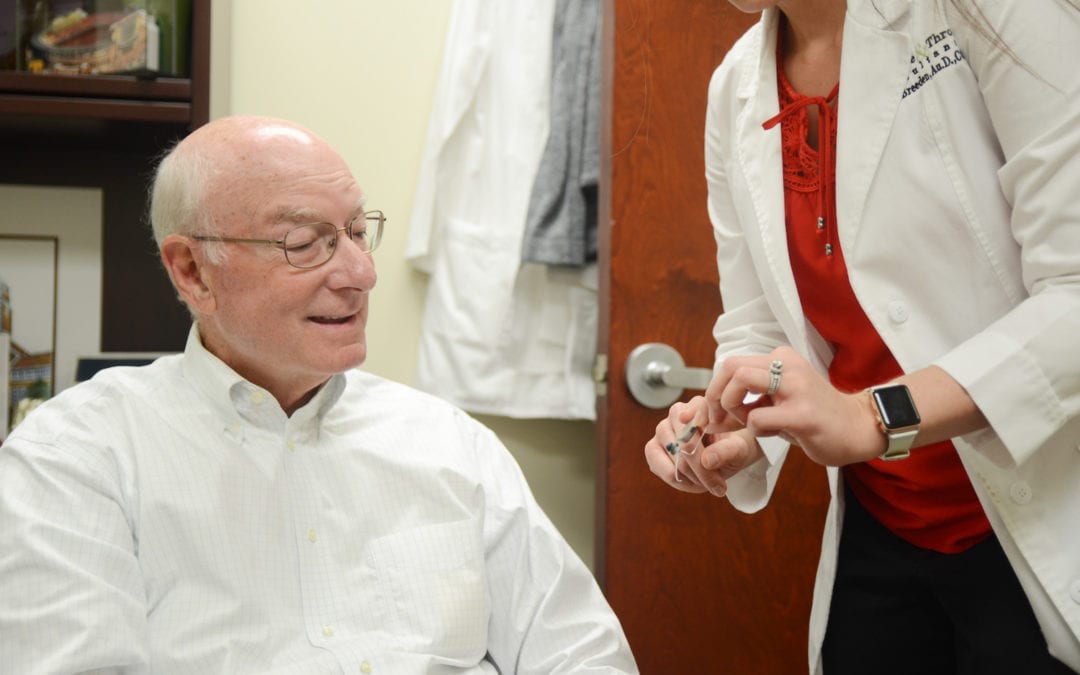You wondered if your aging parent’s hearing was getting worse, but now it’s painfully clear. They are indeed suffering from hearing loss. Midway through a conversation that others in the home are having, grandpa chimes in loudly with a completely off the subject topic. As you tactfully address his statement and then attempt to regain your previous train of thought, you realize that these interruptions are going to be the rule of the day unless his failing hearing is addressed.
Or perhaps you are the spouse of a not so aged partner who has experienced a lifetime of exposure to loud noises from either the workplace or extracurricular activities. With no response when you call from the other room, you may find yourself getting more and more irritated, having to wave and use non-verbal cues to get their attention visibly.
But how to address this problem that could prove to be embarrassing for your loved one without causing offense?
Don’t Push “Hearing Aids.”
The first step is to avoid mentioning “hearing aids.” To most people, there is a stigma attached to reaching that stage in your life where hearing aids are necessitated. Can you remember having a conversation with your grandmother while she struggled to dial up the volume? The resulting shrill ringing startled all in the room, much to her embarrassment as well as yours. And we all can relate to the frustration felt trying to convey an essential message to someone with hearing loss while they fiddle with their hearing aid battery or complain about it not working correctly.
To someone who has witnessed these things firsthand, the reality that they now fit into that category where they are now the “deaf” person in the room, may result in firm denial. You could cautiously ask them in a private setting if they have noticed difficulty in hearing things being said. If they sharply deny, you can explain that it appears to you that they sometimes miss things being said and perhaps it would be a good time to get their hearing checked by an audiologist. If they are still resistant to this idea, you can highlight their hearing health check-ups as being as crucial as their general health and dental check-ups
Show Them What Modern Hearing Aids Look Like
We are unaware of many people wearing hearing aids today thanks to modern technology and the advent of ITC (in the canal) style hearing aids. These devices fit inside the ear canal and are custom-made for each individual. You might mention to your loved one the names of people that you know who wear hearing aids but that are unnoticeable due to the small and discrete modern device. You could also show them pictures of new hearing aids. Reassure them that they are smaller than ever, nearly invisible, and customized according to the individual’s needs and lifestyle.
They are Not Alone
For younger people dealing with hearing loss, it may be reassuring to know that they are not alone. This article in AARP explains that musicians are particularly susceptible to hearing loss after decades of exposure to loud music. Big names such as Neil Young, Pete Townsend, and Sting are among many who have dealt with noise-induced hearing loss.
The National Institute on Deafness and Other Communication Disorders reports that 28 million Americans suffer from hearing loss, including one very famous American. Former US president, Bill Clinton was fitted for hearing aids back in 1997 during his second term in office. Chances are, you and your loved one never even suspected this about our youthful 42nd president. Perhaps just knowing that it is possible to be hugely successful while suffering from hearing loss may alleviate the negative perceptions had about hearing loss and pursuing treatment.
Offer to Foot the Bill
For our loved ones on fixed incomes, the cost of hearing aids may be the sole, unspoken reason for their dismissal of treating their hearing loss. Nobody enjoys asking for help, especially when the price of what this entails can be uncertain. But if you take on this financial responsibility yourself, reassuring them that this is your gift to them, they may be more inclined to pursue treatment. The good news is that there are also leasing and finance options available that make achieving better hearing a more accessible option for all.
If you have successfully navigated this conversation with your loved one and you are ready to take the next step, contact us here to schedule a hearing assessment at one of our five convenient locations in East Tennessee. Physicians Hearing Care is proud to announce our partnership with ENT Consultants of East Tennessee that ensures our commitment to delivering high-quality care utilizing the latest innovative technology.




